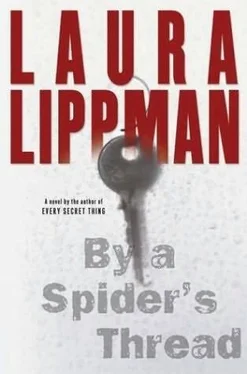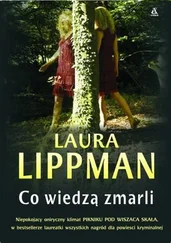"Maybe Natalie isn't the person you thought she was. Maybe she's concealing something far worse than you could ever imagine."
"She's the mother of my children. What else matters? We're the adults, we can work out whatever we need to work out. But children are better off when their parents stay together."
They drove for a few more miles in silence. Tess saw an ad for a real-estate agent, one in which two giant hands shook and sealed a deal for a little piece of the American dream.
"You touched me today," she said.
"What?"
"You pushed my head down. Before you-"
"Any Jewish law can be suspended if a person's life is in danger."
"Yeah, but you shook Gloria Hess's hand, too. Didn't hesitate."
He had the good grace to blush. "In business a man has to shake hands sometimes."
"So why did you make such a show of not shaking mine the first time I offered it?"
"You offered it and withdrew it before I could do anything. In that moment… well, I didn't think it would be such a bad thing if you were a little off balance."
"You mean you thought it would be good if I felt tentative enough that I didn't ask too many hard questions. What else are you keeping from me, Mark?" Tess realized with a start it was the first time she had used his first name. He had been "Mr. Rubin" to her in conversation, "Rubin" in her head. Nothing like a little justifiable homicide to bring two people closer.
"Nothing. Absolutely nothing. What are you keeping from me?"
"Nothing. Absolutely nothing."
Tess wondered if Mark were lying, too.
The countryside was fading away and the suburbs, with their diffuse, fuzzy lights, came rushing toward them. Mark Rubin was not as delusional as Tess had once thought. He had sought the assistance of a private detective, insisting there were no overt problems in his marriage, convinced that some secret had cost him the life he knew. Almost everything Tess had learned so far supported this original theory. Natalie did have a secret. And her father, used to getting a cut of whatever Natalie made, had tried to blackmail her. Mark Rubin had been stalwart enough not to peek under the lid of that Pandora's box. For a decade, that had granted Natalie a reprieve from her scheming father. But now Boris had a new buyer for his information. If Natalie cared for Mark, would she rationalize that leaving him was the only way to save him?
Then where did the mystery man fit in? And was a desire to protect his criminal enterprises the only reason that Amos Greif had produced that shotgun, clearly ready to kill them both? The mountain had come to Muhammad. Mark was the mountain. Greif had been expecting to see him, only not today, not on his property.
"Lana's the key," Tess said, thinking out loud. "I'm going to follow her tomorrow, see where she leads us."
"Can I come along?"
"You have a business to run. Besides, that's not very professional. You hired me to do this stuff. I don't need anyone riding shotgun." Mark grimaced. "Sorry, poor choice of words. You know, you should… see someone."
"I should start dating while I'm still looking for my wife?"
"No, I mean… what you did today. It will stay with you in ways you might not expect. Even when there's no choice, when it's you or him, it leaves a mark."
"So you think I should go to counseling?"
"Yes."
"Is that what you did?"
"More or less." Tess had already been in counseling, for unrelated reasons, but she'd been smart enough to realize she needed the therapist's help.
"Well, if you had a God, maybe you could have talked to him and prayed to him. And saved yourself a little money in the process."
"God is great, and God is good," Tess intoned. "But he can't get you prescription drugs."
It was after ten when Tess arrived home, and the dogs were almost hysterical, although she had arranged for a neighbor boy to walk and feed them when she realized she wouldn't be back until late. They were probably scared she had simply left, never to be seen again.
After all, Crow had.
He had been gone less than a month, but even a day was an eternity to Esskay and Miata. Or perhaps they had sussed out, from the tenor of the conversations in the house in the days before he left, that Crow didn't plan on coming back.
Sure, he had left some clothes behind, along with various objects that he would want eventually-CDs, art supplies, a Swiffer. But he wasn't going to come through the door at 2:00 a.m. anymore and slide into bed next to Tess, pirating her warmth. He wasn't around to take over the kitchen, impulsively swept up in his need to make a souffle or risotto. Crow being Crow, he wasn't the type of boyfriend to wreck a kitchen and leave the mess to his girlfriend. He cleaned up as he went, so there was relatively little to do at the end of one of his meals. When Tess once asked why he was so considerate, he said, "After I've made someone dinner, I don't want her expending all her energy on the kitchen. I want her to focus her goodwill on me." He was, as her friend Whitney had once observed, the perfect postmodern boyfriend.
So why had Tess balked when he suggested that she promote him to perfect postmodern husband?
The proposal, such as it was, had come on a perfect summer night late in August, as they walked the dogs through the deepening dusk. There had been a sudden change in the air, and although the nights were still warm, it was clear the sultry summer was losing its grip. Tess had been meandering along with Miata, so docile and easy to walk, while Crow had been holding on to Esskay, who had a major chip on her bony shoulder when it came to all other living creatures. Squirrels, rabbits, cats, other dogs, fast-moving pieces of paper-Esskay lunged at anything that moved.
"She's like that cartoon character-the little cat-who's always saying, 'Let me at 'em, let me at 'em,' " Tess observed, then felt stupid for having such lowbrow cultural references. Why couldn't she allude to Dickens with the same alacrity with which she cited cartoons?
"She's like you," Crow said.
"That's nice."
"Just an affectionate observation. Actually, you're not quite as thin-skinned as you were when we met. But you used to go at the world that way, always expecting dissent and antagonism."
"And I was right, most of the time."
"Do you think I've been good for you?"
Esskay had dragged Crow from the path, intent on sniffing the base of a tree, so Tess could not see his face just then.
"Probably."
"Do you think we should get married?"
Perhaps it was the fact that Tess could not see his face, or perhaps it was the near dark, which seemed to make everything portentous, so that the consequences of a lie seemed more grave than usual. At any rate, she said what she was thinking, swiftly and regretfully: "No."
Three days of arguing followed, disputes notable only by the universality of the cliches thrown back and forth: You're afraid to commit. Marriage is just a meaningless legal construct, in which two people agree to pool all their stuff, so they can pay lawyers to split it up seven years later. If it's so meaningless, why not just humor me and do it ?
It would be wrong to say they were relieved when the call came from Charlottesville with the news that Crow's mother had a cancerous lump in her breast. But the family emergency did grant them a reprieve from their own problems. Within a week Crow had called with the glad news that his mother had received the best possible prognosis, but he wanted to stay with his parents for a while, perhaps audit a few courses at UVA. Tess had accepted the decision for the gracious, passive cease-fire she assumed it was.
Was she happy, was she free? The question was not so absurd. She was free, but miserable. She didn't want to live without Crow, but she didn't want to live with him if that meant being a wife. She wasn't sure she wanted to be anyone's wife. She tried to graft the details of marriage and family onto her life, and they just didn't fit. She imagined herself on surveillance, a fractious baby in a car seat. She saw herself trying to tiptoe out of the house in the morning, en route to her 7:00 a.m. row, only to have a child demanding its due. Unlike a dog, a child would not be content with a quick walk and a biscuit.
Читать дальше












